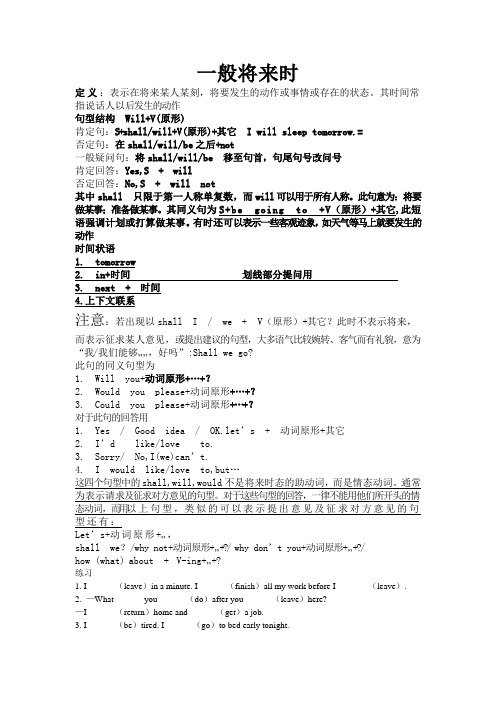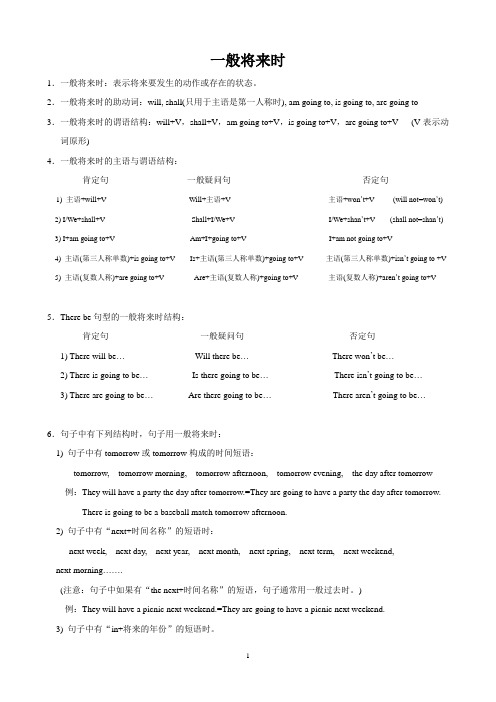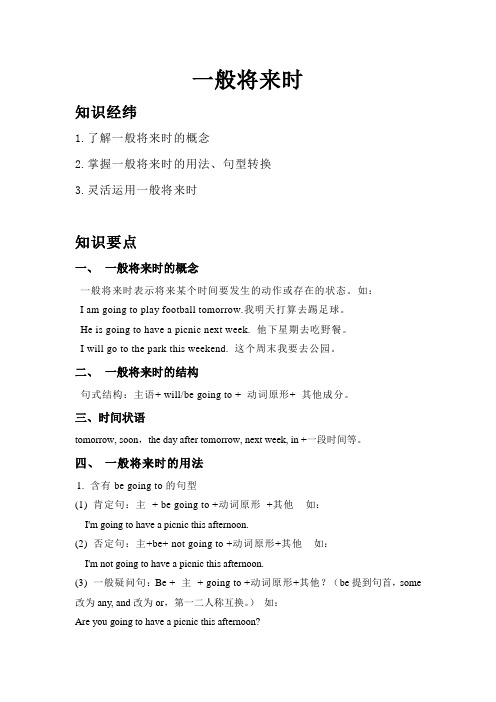一般将来时
一般将来时

一般将来时定义:表示在将来某人某刻,将要发生的动作或事情或存在的状态。
其时间常指说话人以后发生的动作句型结构 Will+V(原形)肯定句:S+shall/will+V(原形)+其它 I will sleep tomorrow.=否定句:在shall/will/be之后+not一般疑问句:将shall/will/be 移至句首,句尾句号改问号肯定回答:Yes,S + will否定回答:No,S + will not其中shall 只限于第一人称单复数,而will可以用于所有人称。
此句意为:将要做某事;准备做某事。
其同义句为S+be going to +V(原形)+其它,此短语强调计划或打算做某事。
有时还可以表示一些客观迹象,如天气等马上就要发生的动作时间状语1. tomorrow2. in+时间划线部分提问用3. next + 时间4.上下文联系注意:若出现以shall I / we + V(原形)+其它?此时不表示将来,而表示征求某人意见,或提出建议的句型,大多语气比较婉转、客气而有礼貌,意为“我/我们能够……,好吗”:Shall we go?此句的同义句型为1. Will you+动词原形+…+?2. Would you please+动词原形+…+?3. Could you please+动词原形+…+?对于此句的回答用1. Yes / Good idea / OK.let’s+ 动词原形+其它2. I’d like/love to.3. Sorry/ No,I(we)can’t.4. I would like/love to,but…这四个句型中的shall,will,would不是将来时态的助动词,而是情态动词。
通常为表示请求及征求对方意见的句型。
对于这些句型的回答,一律不能用他们所开头的情态动词,而用以上句型,类似的可以表示提出意见及征求对方意见的句型还有:Let’s+动词原形+…,shall we?/why not+动词原形+…+?/ why don’t you+动词原形+…+?/how (what) about + V-ing+…+?练习1. I ______(leave)in a minute. I ______(finish)all my work before I ______ (leave).2. —What ______ you ______(do)after you ______(leave)here?—I ______(return)home and ______(get)a job.3. I ______(be)tired. I ______(go)to bed early tonight.4. Mary’s birthday is next Monday, her mother _____(give)her a present.( ) 1. There __________ a meeting tomorrow afternoon.A. will be going toB. will going to beC. is going to beD. will go to be ( ) 2. Charlie ________ here next month.A. isn’t workingB. doesn’t workingC. isn’t going to workingD. won’t work ( ) 3. He ________ very busy this week, he ________ free next week.A. will be; isB. is; isC. will be; will beD. is; will be( ) 4. There ________ a dolphin show in the zoo tomorrow evening.A. wasB. is going to haveC. will haveD. is going to be( ) 5. –________ you ________ free tomorrow?– No. I ________ free the day after tomorrow.A. Are; going to; willB. Are; going to be; willC. Are; going to; will beD. Are; going to be; will be( ) 6. Mother ________ me a nice present on my next birthday.A. will givesB. will giveC. givesD. give( ) 7. – Shall I buy a cup of tea for you?–________. (不,不要。
一般将来时用法总结

一般将来时1.一般将来时:表示将来要发生的动作或存在的状态。
2.一般将来时的助动词:will, shall(只用于主语是第一人称时), am going to, is going to, are going to3.一般将来时的谓语结构:will+V,shall+V,am going to+V,is going to+V,are going to+V (V表示动词原形)4.一般将来时的主语与谓语结构:肯定句一般疑问句否定句1) 主语+will+V Will+主语+V 主语+won’t+V (will not=won’t)2) I/We+shall+V Shall+I/We+V I/We+shan’t+V (shall not=shan’t)3) I+am going to+V Am+I+going to+V I+am not going to+V4) 主语(第三人称单数)+is going to+V Is+主语(第三人称单数)+going to+V 主语(第三人称单数)+isn’t going to +V5) 主语(复数人称)+are going to+V Are+主语(复数人称)+going to+V 主语(复数人称)+aren’t going to+V5.There be句型的一般将来时结构:肯定句一般疑问句否定句1) There will be…Will there be…There won’t be…2) There is going to be…Is there going to be…There isn’t going to be…3) There are going to be…Are there going to be…There aren’t going to be…6.句子中有下列结构时,句子用一般将来时:1) 句子中有tomorrow或tomorrow构成的时间短语:tomorrow, tomorrow morning, tomorrow afternoon, tomorrow evening, the day after tomorrow 例:They will have a party the day after tomorrow.=They are going to have a party the day after tomorrow.There is going to be a baseball match tomorrow afternoon.2) 句子中有“next+时间名称”的短语时:next week, next day, next year, next month, next spring, next term, next weekend,next morning…….(注意:句子中如果有“the next+时间名称”的短语,句子通常用一般过去时。
一般将来时

一般将来时知识经纬1.了解一般将来时的概念2.掌握一般将来时的用法、句型转换3.灵活运用一般将来时知识要点一、一般将来时的概念一般将来时表示将来某个时间要发生的动作或存在的状态。
如:I am going to play football tomorrow.我明天打算去踢足球。
He is going to have a picnic next week. 他下星期去吃野餐。
I will go to the park this weekend. 这个周末我要去公园。
二、一般将来时的结构句式结构:主语+ will/be going to + 动词原形+ 其他成分。
三、时间状语tomorrow, soon,the day after tomorrow, next week, in +一段时间等。
四、一般将来时的用法1. 含有be going to的句型(1) 肯定句:主+ be going to +动词原形+其他如:I'm going to have a picnic this afternoon.(2) 否定句:主+be+ not going to +动词原形+其他如:I'm not going to have a picnic this afternoon.(3) 一般疑问句:Be + 主+ going to +动词原形+其他?(be提到句首,some 改为any, and改为or,第一二人称互换。
)如:Are you going to have a picnic this afternoon?肯定回答:Yes, I am.否定回答:No, I’m not.2. 含有will的句型(will可用于所有人称,shall只用于第一人称I和we)( 1 ) 肯定句:主+ will +动词原形+其他如:I will play football tomorrow.(2) 否定句:主+ won’t +动词原形+其他(will后加not成won't)如:I won’t play football tomorrow.(3) 一般疑问句:Will + 主+ +动词原形+其他?(will提到句首,some改为any, and改为or,第一二人称互换) 如:Will you play football tomorrow?肯定回答:Yes, I will.否定回答:No, I won’t.五、一般将来时的特殊疑问句一般情况下,一般将来时的对划线部分有三种情况。
一般将来时的知识点

明思教育牛津英语7B英语语法(三)一般将来时一、一般将来时的动词形式一般将来时表示将来某个时间将要发生的动作或存在的状态,也表示将来经常或反复发生的动作。
一般将来时由助动词shall或will加动词原形构成,shall用于第一人称,will 用于第二、三人称。
但是现在第一人称一般也用will,其区别并不明显。
(或“be going t+动词原形)常与tomorrow, next …,inthe)future, soon, in five days, in two weeks 等连用。
如:I shall not come if it ra ins tomorrow.女口明天下雨我就不来。
My father will leave for Ch ina next week.我的爸爸下星期要到中国去。
“I ' ll, You ' II, He ' ll , She ' ll , I是简缩形式We ' ll , They ' ll …”二.一般将来时的句型1•肯定句:主语+shall /will+动词+ 其他成份The workers will build a new school here next year.工人们明年将在这儿盖一所新学校。
They will go shoppi ng this afternoo n.今天下午他们将要去购物。
We shall have a delicious dinner ton ight 今晚我们将美餐一顿。
We shall be there before dark.我们天黑前会到达那里。
2. 否定句:主语+shall /will+not+ 动词+ 其他成份She won' t come back this wee这一周她不回来了。
I will not go shopp ing one hour later. 一小时之后我不会去购物。
一般将来时态

this evening
What is the mouse going to do this evening? It is going to do its homework.
will
What is she going to do? She’s going to shop/ go shopping...
They are going to dance.
will
What are they going to do this evening? They are going to watch TV.
will
句式的变化规则:
1.变否定句—---在be/will后加not 。 2.变一般疑问句------将be/will动词提前。 (主语是第一人称I 时,变一般疑问句 时将I 变you) 3.特殊疑问句(也就是对划线部分提问) -----要用特殊疑问词what +一般疑问句。
表示“不肯”、“不能”等: e.g. We asked her to be the director but she won’t agree. Oil and water won’t mix. The car won’t start.
可表示未来情况的还有:
be going to 结构 现在进行时 一般现在时 be about to 结构 be + 不定式结构
系动词am,is,are的原形都是 。 例如: 系动词 , , 的原形都是be。 例如: 的原形都是 People will have robots in their home. 人们的家中将会有机器人。 人们的家中将会有机器人。 There will be one country in the world. 世界上将会只有一个国家。 世界上将会只有一个国家。 shall适用于第一人称 ,We;而will适用于所有人称。 适用于第一人称I, ; 适用于所有人称。 适用于第一人称 适用于所有人称 通常可以用will来代替 来代替shall。 通常可以用 来代替 。 will,shall均可缩写为:'ll,如: 均可缩写为: , , 均可缩写为 I will= I'll; ; she will = she’ll;will not 和shall not分别可以 ; 分别可以 缩写为 won't 和shan't。 。
英语一般将来时

英语一般将来时英语一般将来时,又称为未来时态,是用来表示将来会发生的动作、事件或状态的一种时态。
它的构成通常由"will" 或 "be going to" 加上动词原形来表示。
下面将详细介绍英语一般将来时的用法。
一、"will"的用法:1. 表示将来的决心、意图、打算或做出的决定。
例如:I will help you with your homework after dinner.(晚饭后我会帮你做作业。
)2. 表示对将来的预测、推测或猜测。
例如:It will rain tomorrow.(明天会下雨。
)3. 表示对将来的自然趋势、发展或趋势。
例如:Technology will continue to advance in the future.(科技将来会继续发展。
)4. 表示对将来的保证、允诺、请求或建议。
例如:I promise I will be on time for the meeting.(我保证会准时参加会议。
)二、"be going to"的用法:1. 表示对将来已经计划或决定好的事情。
例如:I am going to visit my grandparents this weekend.(这个周末我打算去看望我的祖父母。
)2. 表示对将来可能发生的事情有一种预见或判断。
例如:Look at those dark clouds. It's going to rain.(看那些乌云,将要下雨了。
)3. 表示以现有证据或迹象预测未来。
例如:She's been studying very hard. She's going to pass the exam.(她一直学得很努力,她一定会通过考试的。
)三、注意事项:1. 一般将来时中的时间状语词可以是今天、明天、以后、将来、下个月等表示将来的时间状语词。
一般将来时
一般将来时一、一般将来时的定义:一般将来时表示将来某一时刻的动作或状态,或将来某一段时间内经常的动作或状态。
常见的一些表示将来的时间状语,如:tomorrow(明天),next week/month/year(下周/月/年),from now on(从现在开始);in the future(将来),this Sunday(这个周日),in two years(两年内)等。
二、一般将来时的形式:1.在肯定句中,will 常简略为'll,并与主语连写在一起,如:I'll,he'll, she'll,it'll,we'll,you'll,they'll。
2.一般将来时中,一般疑问句的形式:(1) Will you…?—Yes,I will. 或No, I will not(=won't);(2) Shall you…?—Yes,I shall. 或No, I shall not.(3) Be(am/is/are)+主语+going to+动词原形+其它+?如:Are you going to swim tomorrow?—Yes, I am./ No, I'm not.Is he/she going to play football next weekend?—Yes, he/she is./ No, he/she isn't.Are they going to go shopping this Sunday?—yes, they are./ No, they aren't.三、一般将来时的用法:1.一般将来时由“助动词shall(用于第一人称),或者will(用于第一、二、三人称)+动词原形”构成。
这种将来意义常常夹杂着情态意义即带有说话人的主观态度和看法,比如表示“预见”。
有时也含有“意愿”或“意图”的意思。
一般将来时的语法规则
一般将来时的语法规则一般将来时是英语中表示将来发生的动作或状态的一种时态。
它用来表达将来某个时间点或某段时间内将要发生的动作、事件或状态。
一般将来时的构成主要依靠助动词"will"或"be going to",并根据具体情况使用不同的动词形式。
1. 使用"will"构成一般将来时一般将来时最常用的构成形式是使用助动词"will"加上动词原形。
例如:- I will go to the park tomorrow.- She will study English this weekend.2. 使用"be going to"构成一般将来时另一种常见的构成形式是使用"be going to"加上动词原形。
"be going to"表示根据现有迹象或计划,某事几乎是肯定会发生的。
例如:- They are going to have a party next week.- We are going to visit our grandparents during the summer vacation.3. 表示计划、安排或打算一般将来时还可以用来表示计划、安排或打算。
例如:- I will meet you at the airport.- She is going to take a vacation next month.4. 表示预测、推测或判断一般将来时还可用来表示预测、推测或判断。
例如:- It will rain tomorrow.- The price of oil is going to increase.5. 使用时间状语和频率副词在一般将来时的句子中,可以使用时间状语词或频率副词来指明动作发生的时间或频率。
例如:- He will come to the party tonight.- They are going to travel to Europe next year.6. 否定形式和疑问形式在一般将来时的句子中,要表示否定形式,只需在助动词"will"前加上"not"。
一般将来时
第七讲:一般将来时一. 一般将来时表示将来某一时刻的动作或状态。
常常和表示将来的时间状语连用。
如:tomorrow(明天),next week(下周);in the future(将来),in+时间段等。
二. 一般将来时的句型结构:肯定句:主语+will/shall+ 动词原形+其它否定句:主语+ will/shall not+ 动词原形+其它一般疑问句:Will/Shall+主语+ 动词原形+其它?回答: Yes,主语+will/shall No,主语+will /shall not【注意】will 用于各种人称,shall用于第一人称。
will not=won’t shall not=shan’t另外is/am/are going to+动词原形也用于一般将来时肯定句:主语+is/am/are going to+动词原形+其它否定句:主语+is/am/are+not going to+动词原形+其它一般疑问句:Is/am/are+主语+going to+动词原形+其它?回答:Yes, 主语+is/am/are No, 主语+is/am/are+not【注意】Be(am/is/are)随着主语的变化而变化。
1)表示有计划,有打算将要做某事。
Li Lei is going to see his aunt next Sunday.2)go,come,leave,start,arrive等表示位置移动的动词用进行时表示将来。
He is leaving for Beijing next week.三.There be结构的一般将来时:肯定句:There will be....或There is /are going to be....否定句:There will not be....或There is/are not going to be.....一般疑问句:Will there be....或Is/Are there going to be.......回答:Yes, there will. 或 Yes, there is/are.No,there won’t. 或No, there is/are not.一般将来时练习题:一.用括号内所给动词的正确形式填空。
一般将来时态
7.明天的天气会是怎样? What _w_i_ll_t_h_e_w__ea_t_h_e_r _b_e_ l_ik_e__ tomorrow?
4. be about to + 动词原形。 表示 (1)“即将做”或“马上做”
(2)因此,句子不能再用时间状语。
Don’t leave. Li Lei is about to come. 不要走了,李蕾就要来了。 Be quiet. The concert is about to start. 安静下来,音乐演唱会就要开始了。
4:00.
I won’t call Mr. Gao today. I’ll call him tomorrow.
back
“There be”句型的一般将来时 肯定句: There will be +名词+其他成份 [注意]:无论后面加单数名词或复数形式,be都必须用原形。
There will be only one country. 否定句:在will后面加not.
_M_a_y_b_epeople __w_i_ll __l_iv_e __t_o_ _b_e_ 200 years old __in__ 100 years. 3. 许多女孩子喜欢养宠物。
Many girls like _k_e_e_p_i_nga pet. 4. There will be a sports meeting tomorrow.(一般疑问句)
2.They will finish (finish) the work this afternoon.
3.Tom will play (play) football with us tomorrow.
